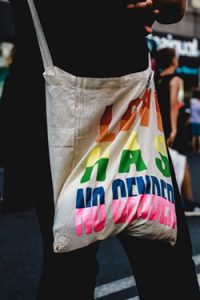
The mere fact that we are having an increasingly open and increasingly vocal conversation about minimalism, eco-consciousness, and carbon footprint reduction means we have finally seen the error of our ways and started to make the necessary changes.
The modern lifestyle is harmful to so many things: our mental health, our physical health, our environment, our future.
Minimalism, as an answer to these harms, may seem difficult to embrace. After all, it demands a hefty toll: giving up so much of what we have become accustomed to.
However, living a minimalist life can significantly reduce your carbon footprint: thus making a play for a healthier, cleaner, and a life with better prospects.
Here is where you can start:
Take a look at what you already own
Chances are you already own most of what you need: and then some.

In order to embrace minimalism, you will need to declutter your entire existence.
Start small, and think about every item before you make a decision.
One of the best places to start is your closet, but you can take it room by room, drawer by drawer, cupboard by cupboard.
You can make a list of everything you own, and think about what you actually need, then start reducing your piles.
Repurpose, reuse or donate
 If you were to simply throw out a bunch of items, that would actually add to your carbon footprint: so instead, see how you can repurpose and reuse everything you own.
If you were to simply throw out a bunch of items, that would actually add to your carbon footprint: so instead, see how you can repurpose and reuse everything you own.
What you want to get rid of: donate. Be it clothing, shoes, books, pots and pans, pieces of furniture: there is a charity out there that will be glad to receive a donation.
What you must get rid of, recycle.
Shopping as a minimalist
After you have given away what you don’t need and don’t use: you will still need to purchase items from time to time.
 When shopping for clothes and cosmetics, look for quality over quantity. You want your clothes to last you for years, and never go out of style. Create a capsule wardrobe you are proud of, and add in a couple of accent pieces that will give it a lift.
When shopping for clothes and cosmetics, look for quality over quantity. You want your clothes to last you for years, and never go out of style. Create a capsule wardrobe you are proud of, and add in a couple of accent pieces that will give it a lift.
When buying food, makeup, and anything else that you will end up using up, look for recycled and recyclable packaging, and clean beauty and food items.
Always buy locally if you can: don’t shop internationally if you don’t need to, and focus on supporting smaller brands, or brands that have made it a point of being kind to the environment.
Think of how you move around
 One of the biggest contributors to the greenhouse effect is transportation. So instead of driving, hopping in an Uber or even taking public transport (although that is the best option of the three), try to walk or bike to wherever you can.
One of the biggest contributors to the greenhouse effect is transportation. So instead of driving, hopping in an Uber or even taking public transport (although that is the best option of the three), try to walk or bike to wherever you can.
Get into the habit of setting off a bit earlier, and enjoy the walk or ride to your destination.
You can also invest in an e-bike, which will help you get where you need to be in less time and in a much more eco-friendly manner. If you are wondering just how far it can take you, you can easily calculate your bike’s range, and be certain you will get to your destination in the allotted time.
How much do you spend
The amount of energy we consume is another aspect of our lives we can definitely work on.
 Start by unplugging any devices you are not using at the time, and turning the lights off in rooms you are not in. Switch to LED light bulbs, and when buying appliances, make sure they have at least an A+ energy rating.
Start by unplugging any devices you are not using at the time, and turning the lights off in rooms you are not in. Switch to LED light bulbs, and when buying appliances, make sure they have at least an A+ energy rating.
Dry your clothes on a line instead of in the dryer, and only wash your clothes when you have a full load, as opposed to every couple of shirts’ time.
Turn off the tap while shaving, washing your makeup brushes, and doing the dishes. You don’t need the water to keep running all the time.
Think about what you cast away
 Being a minimalist also means not using plastic anymore – so invest in a water bottle and a travel mug (both can be recyclable plastic, if you are afraid of using glass – but you need to use them forever), and take them with you when going out.
Being a minimalist also means not using plastic anymore – so invest in a water bottle and a travel mug (both can be recyclable plastic, if you are afraid of using glass – but you need to use them forever), and take them with you when going out.
Don’t buy coffee in plastic cups, don’t use straws and stirrers, and don’t buy water in plastic.
When going to the shops, always take a tote bag with you, and carry what you buy in it – so no bags for anything, unless they are paper for your fruits and veg. Don’t buy prepackaged vegies that come in plastic containers.
Final thoughts
Minimalism is a lifestyle – and one you can embrace with a bit of practice and mindfulness. Don’t expect yourself to make a radical switch and get rid of everything you don’t need all in one week. Take slower and smaller steps, and once you get used to a certain habit, adopt the next one.




